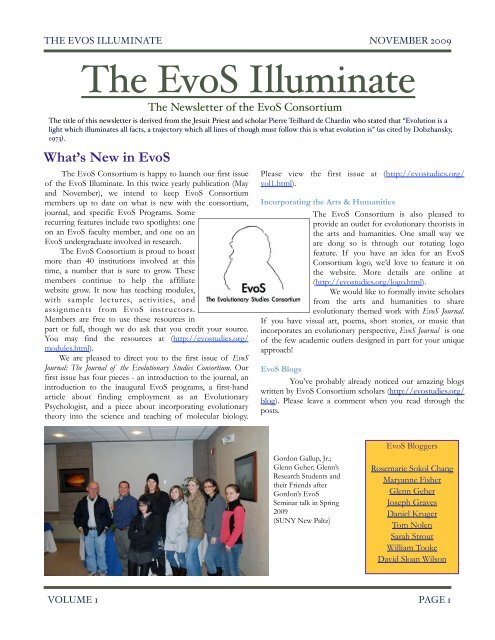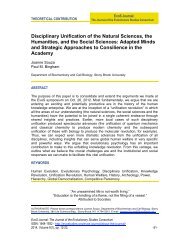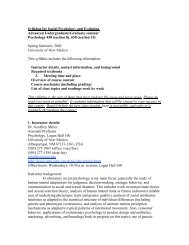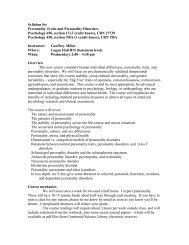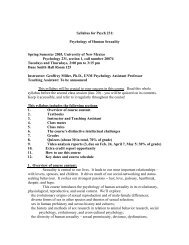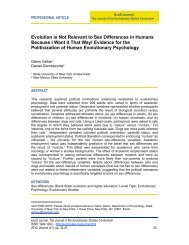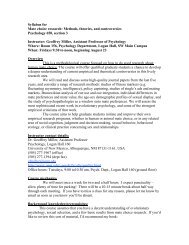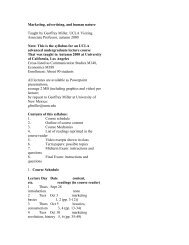Volume 1 - Welcome to the EvoS Consortium!
Volume 1 - Welcome to the EvoS Consortium!
Volume 1 - Welcome to the EvoS Consortium!
Create successful ePaper yourself
Turn your PDF publications into a flip-book with our unique Google optimized e-Paper software.
THE EVOS ILLUMINATE NOVEMBER 2009<br />
The <strong>EvoS</strong> Illuminate<br />
The Newsletter of <strong>the</strong> <strong>EvoS</strong> <strong>Consortium</strong><br />
The title of this newsletter is derived from <strong>the</strong> Jesuit Priest and scholar Pierre Teilhard de Chardin who stated that “Evolution is a<br />
light which illuminates all facts, a trajec<strong>to</strong>ry which all lines of though must follow this is what evolution is” (as cited by Dobzhansky,<br />
1973).<br />
What’s New in <strong>EvoS</strong><br />
The <strong>EvoS</strong> <strong>Consortium</strong> is happy <strong>to</strong> launch our first issue<br />
of <strong>the</strong> <strong>EvoS</strong> Illuminate. In this twice yearly publication (May<br />
and November), we intend <strong>to</strong> keep <strong>EvoS</strong> <strong>Consortium</strong><br />
members up <strong>to</strong> date on what is new with <strong>the</strong> consortium,<br />
journal, and specific <strong>EvoS</strong> Programs. Some<br />
recurring features include two spotlights: one<br />
on an <strong>EvoS</strong> faculty member, and one on an<br />
<strong>EvoS</strong> undergraduate involved in research.<br />
The <strong>EvoS</strong> <strong>Consortium</strong> is proud <strong>to</strong> boast<br />
more than 40 institutions involved at this<br />
time, a number that is sure <strong>to</strong> grow. These<br />
members continue <strong>to</strong> help <strong>the</strong> affiliate<br />
website grow. It now has teaching modules,<br />
with sample lectures, activities, and<br />
assignments from <strong>EvoS</strong> instruc<strong>to</strong>rs.<br />
Members are free <strong>to</strong> use <strong>the</strong>se resources in<br />
part or full, though we do ask that you credit your source.<br />
You may find <strong>the</strong> resources at (http://evostudies.org/<br />
modules.html).<br />
We are pleased <strong>to</strong> direct you <strong>to</strong> <strong>the</strong> first issue of <strong>EvoS</strong><br />
Journal: The Journal of <strong>the</strong> Evolutionary Studies <strong>Consortium</strong>. Our<br />
first issue has four pieces - an introduction <strong>to</strong> <strong>the</strong> journal, an<br />
introduction <strong>to</strong> <strong>the</strong> inaugural <strong>EvoS</strong> programs, a first-hand<br />
article about finding employment as an Evolutionary<br />
Psychologist, and a piece about incorporating evolutionary<br />
<strong>the</strong>ory in<strong>to</strong> <strong>the</strong> science and teaching of molecular biology.<br />
Please view <strong>the</strong> first issue at (http://evostudies.org/<br />
vol1.html).<br />
Incorporating <strong>the</strong> Arts & Humanities<br />
The <strong>EvoS</strong> <strong>Consortium</strong> is also pleased <strong>to</strong><br />
provide an outlet for evolutionary <strong>the</strong>orists in<br />
<strong>the</strong> arts and humanities. One small way we<br />
are dong so is through our rotating logo<br />
feature. If you have an idea for an <strong>EvoS</strong><br />
<strong>Consortium</strong> logo, we’d love <strong>to</strong> feature it on<br />
<strong>the</strong> website. More details are online at<br />
(http://evostudies.org/logo.html).<br />
We would like <strong>to</strong> formally invite scholars<br />
from <strong>the</strong> arts and humanities <strong>to</strong> share<br />
evolutionary <strong>the</strong>med work with <strong>EvoS</strong> Journal.<br />
If you have visual art, poems, short s<strong>to</strong>ries, or music that<br />
incorporates an evolutionary perspective, <strong>EvoS</strong> Journal is one<br />
of <strong>the</strong> few academic outlets designed in part for your unique<br />
approach!<br />
<strong>EvoS</strong> Blogs<br />
You’ve probably already noticed our amazing blogs<br />
written by <strong>EvoS</strong> <strong>Consortium</strong> scholars (http://evostudies.org/<br />
blog). Please leave a comment when you read through <strong>the</strong><br />
posts.<br />
Gordon Gallup, Jr.;<br />
Glenn Geher; Glenn’s<br />
Research Students and<br />
<strong>the</strong>ir Friends after<br />
Gordon’s <strong>EvoS</strong><br />
Seminar talk in Spring<br />
2009<br />
(SUNY New Paltz)<br />
<strong>EvoS</strong> Bloggers<br />
Rosemarie Sokol Chang<br />
Maryanne Fisher<br />
Glenn Geher<br />
Joseph Graves<br />
Daniel Kruger<br />
Tom Nolen<br />
Sarah Strout<br />
William Tooke<br />
David Sloan Wilson<br />
VOLUME 1 PAGE 1
THE EVOS ILLUMINATE NOVEMBER 2009<br />
RECONTEXTUALIZING EVOLUTION: BABA BRINKMAN<br />
PERFORMS AT SUNY NEW PALTZ, 11.16.09<br />
BY: IAN MICHNA<br />
I wasn’t initially planning on staying at Baba’s<br />
performance longer than ten minutes. In my mind, a guide<br />
<strong>to</strong> evolution through rap music seemed like ano<strong>the</strong>r lame<br />
ploy from companies trying <strong>to</strong> deliver information in<br />
"trendy" ways <strong>to</strong> reach <strong>the</strong> youth. It turns out that this was<br />
not <strong>the</strong> case at all. Baba works for no company and is not a<br />
mindless rap drone spitting out choruses of prewritten<br />
material. Actually he is quite <strong>the</strong> opposite, a self-motivated,<br />
intelligent evolutionist with a talent for entertaining. His<br />
extensive rap knowledge combined with a rock-solid<br />
understanding of evolutionary concepts was a potent blend<br />
of information and entertainment. Between his raps he gave<br />
slam poetry-like performances explaining basic evolutionary<br />
concepts. From sexual selection, <strong>to</strong> warfare, it seemed like<br />
<strong>the</strong>re was nothing he couldn’t evolutionarily explain through<br />
<strong>the</strong> vehicle of rap music and culture.<br />
Some of <strong>the</strong> statistics I found most interesting that<br />
he presented that night were <strong>the</strong> ones about homicide, from<br />
Daly and Wilson’s book Homicide. Baba went on <strong>to</strong> explain<br />
cultural problems such as teen pregnancy and high levels of<br />
SPOTLIGHT ON AN EVOS STUDENT<br />
RACHAEL CARMEN IS A GRADUATE AT SUNY NEW<br />
PALTZ, AND AS AN UNDERGRADUATE WAS THE FIRST<br />
STUDENT TO SIGN UP FOR THE NEW PALTZ EVOS<br />
PROGRAM IN 2007. SHE DOES RESEARCH ON HUMOR<br />
UNDER THE ADVISEMENT OF CORWIN SENKO AND<br />
GLENN GEHER.<br />
[EN=EVOS NEWSLETTER; RC=RACHAEL CARMEN].<br />
EN: What has been your favorite course<br />
in school so far?<br />
RC: The best courses were definitely<br />
Evolutionary Studies courses, but I signed<br />
up for <strong>the</strong> <strong>EvoS</strong> program because I loved<br />
everything about it so pretty much every<br />
class was my “favorite”. My <strong>to</strong>p three:<br />
Evolutionary Psychology with Glenn<br />
Geher (Psychology), Seminar in Psychology (Love and Sex)<br />
with Alice Andrews (Psychology), and Human Evolution<br />
with Ken Nystrom (Anthropology). Intro <strong>to</strong> Animal Life<br />
with Michael Boms (Biology) was a very close 4 th .<br />
EN: What is your favorite part of <strong>the</strong> <strong>EvoS</strong> Program?<br />
gang violence by evolutionary survival adaptations <strong>to</strong> <strong>the</strong><br />
environment. In a nutshell, <strong>the</strong> riskier <strong>the</strong> environment, <strong>the</strong><br />
riskier sexual and survival strategies would be employed. As<br />
he explained <strong>the</strong> core concept, he cued up <strong>the</strong> music video<br />
“Survival of <strong>the</strong> Fittest” by Mobb Deep, a tune that<br />
epi<strong>to</strong>mizes East Coast gangsta rap from <strong>the</strong> 90’s. Between<br />
<strong>the</strong> dark morbid piano loop and clips of <strong>the</strong> rap duo snarling<br />
at <strong>the</strong> camera, <strong>the</strong> music video was one of <strong>the</strong> strangest<br />
backdrops for a white guy rapping about evolution. Even<br />
stranger--it worked! Throughout <strong>the</strong> entire night, Baba<br />
continued <strong>to</strong> take some of <strong>the</strong> most lyrically potent rap<br />
songs and completely recontextualize <strong>the</strong>m, discussing <strong>the</strong><br />
<strong>the</strong>mes in an evolutionary light. I used <strong>to</strong> think <strong>the</strong>se types<br />
of societal problems were just due <strong>to</strong> lack of education and<br />
opportunity, but never related <strong>the</strong>m <strong>to</strong> <strong>the</strong> deeper<br />
evolutionary side of <strong>the</strong> problem. At <strong>the</strong> end of <strong>the</strong><br />
performance I could see how evolution wasn’t a detrac<strong>to</strong>r<br />
from o<strong>the</strong>r academic disciplines, but ra<strong>the</strong>r, something that<br />
could work harmoniously with <strong>the</strong>m--with or without rap<br />
music.<br />
RC: There are so many parts of <strong>the</strong> <strong>EvoS</strong> program that are<br />
amazing, but I would have <strong>to</strong> say my favorite is <strong>the</strong><br />
Evolutionary Studies Seminar series. The seminar lets<br />
students from various academic backgrounds get a common<br />
understanding of evolutionary <strong>the</strong>ory in addition <strong>to</strong><br />
introducing <strong>the</strong>m <strong>to</strong> new ideas and current research<br />
studies…I learned not only about Psychology (my major)<br />
but Biology, Anthropology, and Geology.<br />
EN: Please give us a summary of <strong>the</strong><br />
research you are doing at New Paltz,<br />
including how it is infor med by<br />
evolutionary <strong>the</strong>ory.<br />
RC: I am in <strong>the</strong> process of conducting<br />
research on how humor styles affect mate<br />
selection… [I am interested in] two<br />
specific types: Self-Deprecating (making<br />
fun of oneself) and O<strong>the</strong>r-Deprecating (making fun of<br />
o<strong>the</strong>rs)… Humor itself is considered a “fitness indica<strong>to</strong>r”,<br />
meaning that when people effectively use humor, it is<br />
thought <strong>to</strong> be indicative of <strong>the</strong>ir genetic fitness…I also<br />
wanted <strong>to</strong> see if women’s ovula<strong>to</strong>ry cycles had any effect on<br />
humor and mate preference.<br />
VOLUME 1 PAGE 2
THE EVOS ILLUMINATE NOVEMBER 2009<br />
I personally think evolutionary <strong>the</strong>ory is one of <strong>the</strong> most important<br />
things a person can learn—it can truly change your life.<br />
-Rachel Carmen, <strong>EvoS</strong> Student, SUNY New Paltz<br />
[We are] planning on collecting data from women (which<br />
includes three levels – ovulating, not ovulating, and women<br />
on oral contraceptives) and men, regardless of each<br />
participant’s sexual preference. Participants will take <strong>the</strong><br />
study online…and will hear two different audio clips – one<br />
self-deprecating, and one o<strong>the</strong>r-deprecating clip – and <strong>the</strong>n<br />
will be asked <strong>to</strong> rate <strong>the</strong> person in <strong>the</strong> clip on numerous<br />
dimensions… My hypo<strong>the</strong>sis is that, in general, women<br />
will prefer self-deprecating humor, but when <strong>the</strong>y are in<br />
<strong>the</strong>ir peak fertility days, <strong>the</strong>y will tend <strong>to</strong> prefer more<br />
masculine displays, or ra<strong>the</strong>r, o<strong>the</strong>r-deprecating humor.<br />
SPOTLIGHT ON AN EVOS FACULTY MEMBER<br />
JENNIFER WALDO IS AN ASSISTANT PROFESSOR OF<br />
BIOLOGY AT SUNY NEW PALTZ. SHE IS PART OF THE<br />
EVOLUTIONARY STUDIES MINOR, CREATED IN 2007,<br />
AND A CO-PI ON THE NSF GRANT, “EXPANDING<br />
EVOLUTIONARY STUDIES IN AMERICAN HIGHER<br />
EDUCATION” (#0817337).<br />
[EN=EVOS NEWLETTER; JW=JENNIFER WALDO].<br />
EN: What do you think are <strong>the</strong> primary benefits<br />
for students from being part of an <strong>EvoS</strong><br />
program?<br />
JW: Exposure <strong>to</strong> exciting, modern research in<br />
disciplines o<strong>the</strong>r than <strong>the</strong>ir own major. I think a<br />
lot of colleges are structured <strong>to</strong> have a bunch of<br />
“intro” level classes that you have <strong>to</strong> get through<br />
in order <strong>to</strong> understand enough of <strong>the</strong> vocab/<br />
concepts necessary <strong>to</strong> fully appreciate work that<br />
is occurring in <strong>the</strong> field <strong>to</strong>day. This means that if you are<br />
interested in exploring o<strong>the</strong>r fields, <strong>the</strong>re is a big impediment<br />
<strong>to</strong> doing so…..and <strong>the</strong> intro level courses are often more<br />
his<strong>to</strong>rical than modern in <strong>the</strong>ir approach. With <strong>the</strong> <strong>EvoS</strong><br />
seminar series, in particular, students can see <strong>the</strong> type of<br />
research going on by real people, now. Because of <strong>the</strong><br />
evolutionary framework in all of <strong>the</strong> work, <strong>the</strong>y have a way<br />
<strong>to</strong> grasp on without necessarily becoming experts in <strong>the</strong><br />
jargon of <strong>the</strong> field. I think this realization has <strong>to</strong> be<br />
empowering <strong>to</strong> students.<br />
EN: What would you say are <strong>the</strong> primary benefits <strong>to</strong> faculty<br />
from being part of an <strong>EvoS</strong> program?<br />
EN: Has evolutionary <strong>the</strong>ory changed how you think<br />
about <strong>the</strong> world?<br />
RC: Yes, it has changed how I think about <strong>the</strong> world in<br />
every way. It gives me a persistently inquisitive mind in all<br />
aspects of my life. I am constantly looking at <strong>the</strong> world<br />
through an evolutionary lens and questioning <strong>the</strong><br />
reasoning behind specific types of behavior. Despite what<br />
some think, evolution has a lot <strong>to</strong> do with how we behave<br />
<strong>the</strong> way we do. I personally think evolutionary <strong>the</strong>ory is<br />
one of <strong>the</strong> most important things a person can learn—it<br />
can truly change your life.<br />
JW: Pretty much <strong>the</strong> same as for <strong>the</strong> students. I’ve learned a<br />
lot from <strong>the</strong> seminars and even more from just chatting with<br />
faculty and students from o<strong>the</strong>r departments. Even at a<br />
small school like ours, it is easy <strong>to</strong> hunker down in this job<br />
and focus just on teaching/advising/research/just keeping<br />
your head above water. Being a part of <strong>EvoS</strong> has “forced”<br />
me <strong>to</strong> encounter new material, or just think about things<br />
differently. We all know that this is important,<br />
but <strong>EvoS</strong> is a way for me <strong>to</strong> actually do it.<br />
EN: Please give an example of a recent research<br />
project you’ve done, and explain how<br />
evolutionary <strong>the</strong>ory informs your research.<br />
JW: I am a biologist that tries <strong>to</strong> understand<br />
things that go on inside of cells. I could be called<br />
(accurately, even) a cell biologist, molecular<br />
biologist, geneticist, biochemist, or structural<br />
biologist. Since all cells have a common ances<strong>to</strong>r, a lot of <strong>the</strong><br />
machines that do <strong>the</strong> work inside of <strong>the</strong> cell are pretty much<br />
<strong>the</strong> same, regardless of <strong>the</strong> organism. So, by studying<br />
fundamental biological processes in one organism, you can<br />
generate knowledge that can be applied <strong>to</strong> o<strong>the</strong>rs. Also,<br />
uncovering differences between organisms can point <strong>to</strong><br />
adaptations that arose and provided a selective advantage.<br />
So, I study mi<strong>to</strong>sis—that’s <strong>the</strong> process by which a cell divides<br />
up its genetic material prior <strong>to</strong> cell division. It’s critically<br />
important that <strong>the</strong> cell does this correctly, or else <strong>the</strong> two<br />
cells that arise will be genetically different than <strong>the</strong> original<br />
cell.<br />
VOLUME 1 PAGE 3
THE EVOS ILLUMINATE NOVEMBER 2009<br />
There is a ten-protein machine that works <strong>to</strong> separate<br />
chromosomes in dividing cells. There have only been<br />
experiments done <strong>to</strong> address how this complex works in two<br />
different types of yeast. However, <strong>the</strong>re is a technical<br />
problem in studying how this protein complex works—<br />
scientists cannot produce <strong>the</strong> ten individual proteins separate<br />
from each o<strong>the</strong>r. So, one of my recent projects has been <strong>to</strong><br />
study this complex in a third species of yeast, and it turns<br />
out that at least some of <strong>the</strong> ten proteins in this species are<br />
capable of being produced and studied individually. So, <strong>the</strong><br />
inability <strong>to</strong> study <strong>the</strong> individual proteins is a technical<br />
problem, and I am using <strong>the</strong> variation present as a result of<br />
evolution, as a way of overcoming this technical problem.<br />
Now that I have <strong>the</strong> individual proteins, I can start <strong>to</strong> ask<br />
questions about how <strong>the</strong>y work alone and <strong>to</strong>ge<strong>the</strong>r that are<br />
not possible in <strong>the</strong> o<strong>the</strong>r two more widely studied yeasts.<br />
EN: What is your favorite course <strong>to</strong> teach, and why?<br />
JW: I really only teach two courses—genetics and cell<br />
biology. Both are mid-level biology courses. I don’t really<br />
prefer one over <strong>the</strong> o<strong>the</strong>r…..<strong>the</strong>y are both equally<br />
challenging for me <strong>to</strong> teach. I’m not <strong>to</strong> <strong>the</strong> point where I<br />
have ei<strong>the</strong>r course “in <strong>the</strong> bag”. I’m constantly changing how<br />
and what I teach <strong>to</strong> try <strong>to</strong> make it better for <strong>the</strong> students. As<br />
our friend Baba says, performance—feedback—revision.<br />
So, my courses are always evolving (hee hee).<br />
I have a non-science-majors cancer biology course that I<br />
taught once and really would love <strong>to</strong> teach more regularly.<br />
I’m pretty sure that we need <strong>to</strong> do a much much much better<br />
job educating non-scientists about science. Unfortunately,<br />
this doesn’t seem <strong>to</strong> be enough of a priority at <strong>the</strong> present.<br />
EN: James Lip<strong>to</strong>n always ends Inside <strong>the</strong> Ac<strong>to</strong>r’s Studio<br />
with <strong>the</strong> question “If Heaven exists, what would you like <strong>to</strong><br />
hear God say when you arrive at <strong>the</strong> Pearly Gates?” If<br />
Heaven exists, what would you like <strong>to</strong> ask Darwin when you<br />
arrive at <strong>the</strong> Pearly Gates?<br />
JW: I’m going full-bore geek here. I’d want <strong>to</strong> talk <strong>to</strong><br />
Darwin about what/how much he knew about Mendel’s<br />
work. From what I’ve read, <strong>the</strong>re are differing accounts<br />
about how aware <strong>the</strong>y were of each o<strong>the</strong>r, and I’d just be<br />
curious <strong>to</strong> know what <strong>the</strong> real s<strong>to</strong>ry is.<br />
Because of <strong>the</strong> evolutionary framework in all of <strong>the</strong> work, <strong>the</strong>y have a<br />
way <strong>to</strong> grasp on without necessarily becoming experts in <strong>the</strong> jargon of<br />
<strong>the</strong> field. I think this realization has <strong>to</strong> be empowering <strong>to</strong> students.<br />
-Jennifer Waldo, <strong>EvoS</strong> Faculty, SUNY New Paltz<br />
<strong>EvoS</strong> Journal Special Issue: Call for Papers<br />
<strong>EvoS</strong> Journal is planning a special issue on Evolutionary Theory in <strong>the</strong> Humanities.<br />
If you have a manuscript in mind about an educational experience, <strong>the</strong> importance<br />
of evolutionary <strong>the</strong>ory for teaching in your field, or a pedagogical technique, please<br />
submit your manuscript using <strong>the</strong> guidelines at (http://evostudies.org/<br />
submissions.html). If you have an idea for a book review related <strong>to</strong> Evolution in<br />
<strong>the</strong> Humanities, please email Rose at (evostudies@gmail.com).<br />
And for students and faculty – if you have a project that incorporates evolutionary<br />
<strong>the</strong>ory with one of <strong>the</strong> Humanities, please consider submitting it <strong>to</strong> <strong>EvoS</strong> Journal at<br />
(http://evostudies.org/submissions.html). Fiction, poetry, and o<strong>the</strong>r relevant<br />
works are welcome <strong>to</strong>o.<br />
VOLUME 1 PAGE 4
THE EVOS ILLUMINATE NOVEMBER 2009<br />
The Word from <strong>EvoS</strong> Members<br />
NorthEastern Evolutionary<br />
Psychology Society: Call for Papers<br />
Announcing <strong>the</strong> fourth Annual Meeting of<br />
<strong>the</strong> NorthEastern Evolutionary Psychology<br />
Society, Friday, March 26th, through<br />
Sunday, March 28 th , 2010. The 2010<br />
Meeting will be hosted by Dr. Glenn Geher<br />
and his students at <strong>the</strong> State University of<br />
New York at New Paltz.<br />
We are pleased <strong>to</strong> announce that <strong>the</strong><br />
keynote speakers will be Dr. Marlene Zuk<br />
of <strong>the</strong> Department of Biology at <strong>the</strong><br />
University of California (Riverside), and Dr.<br />
Richard Wrangham of <strong>the</strong> Museum of<br />
Comparative Zoology at Harvard<br />
University. The deadline for abstract<br />
submission is January 5th, 2010. Please<br />
encourage your friends, students, and<br />
colleagues <strong>to</strong> participate.<br />
For more information, please visit http://<br />
www.neepsociety.org<br />
<strong>EvoS</strong> Programs:<br />
Schedule of Events<br />
Winter 2009/2010<br />
12.4.09<br />
Location: Bingham<strong>to</strong>n<br />
University<br />
Evolutionary Theory: Toward an<br />
Extended Syn<strong>the</strong>sis?<br />
Massimo Piglucci<br />
[For a full list of BUs Seminar<br />
Series, visit http://<br />
evolution.bingham<strong>to</strong>n.edu/<br />
evos/seminars/fall-2009/]<br />
2.8.10<br />
Location: SUNY New Paltz<br />
Darwin Day, featuring Darwin:<br />
Discovering <strong>the</strong> Tree of Life<br />
Niles Eldridge<br />
2.22.10<br />
Location: SUNY New Paltz<br />
Mutualists, Pathogens, and <strong>the</strong><br />
Evolution of Sex in Wild Garlic<br />
Margaret Bonsheim<br />
Have your own <strong>EvoS</strong> Events<br />
<strong>to</strong> share? Please send word <strong>to</strong><br />
evostudies@gmail.com<br />
This newsletter was written by Rosemarie Sokol Chang with <strong>the</strong> exception of <strong>the</strong> special musical<br />
piece by Ian Michna. Special thanks <strong>to</strong> Jennifer Waldo and Rachael Carmen for being <strong>the</strong> first <strong>EvoS</strong><br />
members <strong>to</strong> be spotlighted in this newsletter. Please send any comments <strong>to</strong> evostudies@gmail.com<br />
VOLUME 1 PAGE 5


